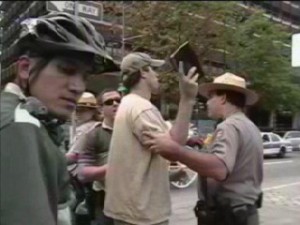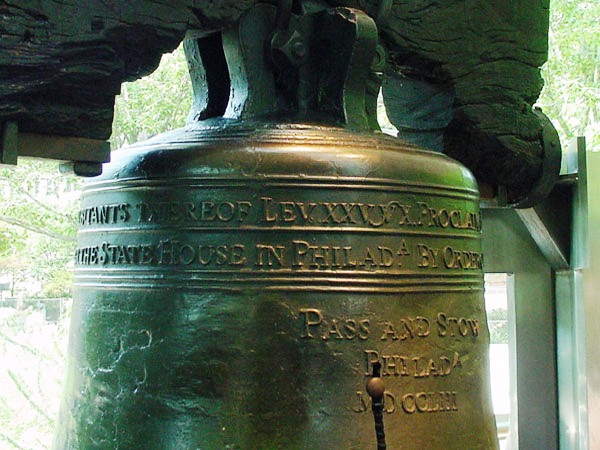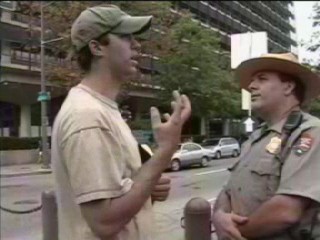 PHILADELPHIA — A civil liberties organization states that the United States Supreme Court is showing signs of interest in a case involving an evangelist who was arrested while preaching near the Liberty Bell.
PHILADELPHIA — A civil liberties organization states that the United States Supreme Court is showing signs of interest in a case involving an evangelist who was arrested while preaching near the Liberty Bell.
The Rutherford Institute is representing Michael Marcavage of Repent America in Marcavage v. Saperstein, et al., which surrounds Marcavage’s unlawful arrest in 2007 while preaching near Independence National Historical Park in Philadelphia.
As Marcavage stood adjacent to the public sidewalk and preached to those waiting in line to see the Liberty Bell, he was approached by Ranger Alan Saperstein, who attempted to relocate him to a “free speech zone” by giving him a “verbal permit.”
“We don’t want the verbal permit,” Marcavage responded as he stood on the sidewalk near the curb. “We don’t believe we need a permit because we are protected by the First Amendment to the United States Constitution.”
“I’m telling you right now, we’d like you to set up over there,” Saperstein responded, pointing to the other side of the building where no members of the public were present.
When Marcavage refused to move his evangelistic preaching and message in opposition of abortion away from the people he was speaking to, he was arrested and charged with “Violating the Terms of a Permit.”
Six months later, Marcavage was issued a citation by certified mail, accusing him of “Interfering with Agency Function.” After a lengthy two-day trial, Marcavage was found guilty and escorted by U.S. marshals to be booked and processed.
He was fined $445, sentenced to a year of federal probation and prohibited from engaging in free speech activities near the Liberty Bell without first obtaining a permit, and even then, only in the “free speech zone.”
The ruling was appealed and upheld the following year, but when the case reached the Third Circuit Court of Appeals, it was overturned unanimously by a three-judge panel.

In U.S. v. Marcavage, the court declared in a 52-page decision that “the government impermissibly infringed Marcavage’s First Amendment right to free speech” because Saperstein and other rangers unlawfully attempted to move Marcavage due to the content of his speech.
“Having been presented with Marcavage’s First Amendment challenge, the government shouldered the burden of establishing that its regulation of his speech was constitutional,” the panel wrote. “But the government was too sure of its position. …. [They] glossed over Marcavage’s belief that the restrictions on his speech were content-based.”
Both criminal charges were subsequently vacated.
The court outlined that it accelerated the release of its opinion as it believed that Marcavage had wrongfully suffered long enough.
“Marcavage was convicted in June 2008, or approximately two years ago. The weight of that conviction no doubt has taken its toll on him during the pendency of this appeal. The passsage of time and the importance of correcting a criminal conviction that may have been obtained in error also counsel or resolution of this case one way or the other,” wrote Judge Michael Fisher.
Marcavage had been scheduled to attend a probation revocation hearing two weeks later for allegedly violating the terms of his probation while engaging in free speech, but it was canceled following the issuance of the Third Circuit’s ruling. The government was seeking to put Marcavage in prison for at least 60 days.

In the civil challenge that followed the ruling, both the Pennsylvania District Court and a separate panel with the Third Circuit Court of Appeals refused to hold the rangers liable for their actions. The Third Circuit ruling stated, “[T]he fact that two judges found no First Amendment violation indicates that Marcavage’s constitutional right to demonstrate on the Sixth Street sidewalk was not clearly established.”
However, Marcavage believes that his right to engage in free speech activity on the public sidewalk was indeed crystal clear at the time of his arrest, and that the judges glossed over the circuit court’s findings that the rangers acted out of discrimination against his speech.
Therefore, Marcavage has appealed his case to the U.S. Supreme Court, and is asking the court to bring clarification regarding when police officers, rangers and other government officials must be responsible for violating the constitutional rights of citizens. The federal government decided not to file a response to Marcavage’s challenge before the court.
Last week, William K. Suter, the clerk of the Supreme Court, issued a letter to the U.S. Department of Justice, strongly advising the government to respond anyway.
“Although your office has waived the right to file a response to the petition for a writ or certiorari in the above case, the court nevertheless has directed this office to request that a response be filed,” the letter stated.
“What that typically means is that the Supreme Court is taking the case very seriously,” explained John Whitehead, president of The Rutherford Institute, which is representing Marcavage before the court. “They want to know what the government’s rationale is.”
“It’s quite unusual,” he advised, noting that the vast majority of cases that are submitted to the Supreme Court for consideration are “routinely dismissed.”
He explained that the Marcavage case is important to the American people because it will help to further clarify what police officers and other government officials must be held accountable for when they violate the constitutional rights of citizens.
“The courts are not holding police officers liable,” he explained. “The [Supreme] Court has been pretty broad on [the issue of qualified immunity] in recent years. The court may reconsider it.”
“Most police officers have no idea what’s in the First Amendment, [such as] the right to free speech,” Whitehead noted. “Police officers now are routinely arresting street preachers like in this case, [and] we have a lot of police officers arresting people who are on public sidewalks. … It’s a widespread problem. People have a right to be where they want to be.”
He cited the recent arrest of missionary Jesse Boyd of Full Proof Gospel Ministries in Holly Ridge, North Carolina, who was taken into custody after telling police officers to “repent” during a Fourth of July celebration. Boyd was jailed for several hours and released on $500 bond.
However, a disorderly conduct charge pressed against Boyd was dismissed days later by Onslow County District Attorney Ernie Lee, citing that Boyd’s speech was protected by the First Amendment.
“[The Marcavage case will help to outline] whether or not police can do that and get away with it,” Whitehead stated. “I hope that this case will send a signal that if you do that, you will get in trouble for it.”
The Supreme Court will decide if it will accept Marcavage v. Saperstein, et al. in the months ahead. The Department of Justice has until August 23 to file a response.
Become a Christian News Network Supporter...


